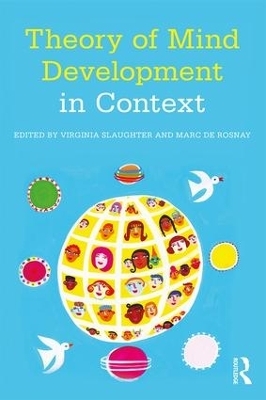
Theory of Mind Development in Context
Routledge (Verlag)
978-1-138-81159-1 (ISBN)
Although much important research has emphasized the role of nature in theory of mind development, this book highlights that children’s understanding of other people is nurtured through their everyday experiences and interactions. This perspective is essential for students, researchers, and practitioners to gain a complete understanding of how this fundamental skill develops in humans. The book is invaluable for academic researchers and advanced students in developmental psychology, education, social psychology, cognitive psychology, and the social sciences, as well as practicing psychologists, counselors, and psychiatrists, particularly those who deal with disorders involving social and/or communicative deficits.
Virginia Slaughter is Professor and Head of the School of Psychology at the University of Queensland, Australia. Marc de Rosnay is Professor and Academic Head of Early Start at the University of Wollongong, Australia.
Introduction: how should we conceptualise contextual influences on young children’s theory of mind development? 1. Learning a theory of mind Part I: Social contexts for development 2. Culture and the sequence of developmental milestones toward theory of mind mastery 3. Family influences on theory of mind: a review 4. Why Montessori is a facilitative environment for theory of mind: three speculations 5. Behaviour to beliefs Part II: Atypical developmental contexts 6. The role of institutionalization in theory of mind 7. The empathic mind in children with communication impairments: the case of children who are deaf or hard of hearing (DHH); children with an autism spectrum disorder (ASD); and children with specific language impairments (SLI) 8. Environment and language experience in deaf children’s theory of mind development 9. Mindreading as a transactional process: insights from autism Appendix: standard theory of mind tasks
| Erscheinungsdatum | 13.03.2017 |
|---|---|
| Zusatzinfo | 2 Tables, black and white; 9 Line drawings, black and white; 3 Halftones, black and white |
| Verlagsort | London |
| Sprache | englisch |
| Maße | 156 x 234 mm |
| Gewicht | 292 g |
| Themenwelt | Geisteswissenschaften ► Psychologie ► Allgemeine Psychologie |
| Geisteswissenschaften ► Psychologie ► Biopsychologie / Neurowissenschaften | |
| Geisteswissenschaften ► Psychologie ► Entwicklungspsychologie | |
| Geisteswissenschaften ► Psychologie ► Verhaltenstherapie | |
| Medizin / Pharmazie ► Gesundheitsfachberufe ► Logopädie | |
| Medizin / Pharmazie ► Medizinische Fachgebiete ► HNO-Heilkunde | |
| ISBN-10 | 1-138-81159-9 / 1138811599 |
| ISBN-13 | 978-1-138-81159-1 / 9781138811591 |
| Zustand | Neuware |
| Haben Sie eine Frage zum Produkt? |
aus dem Bereich


